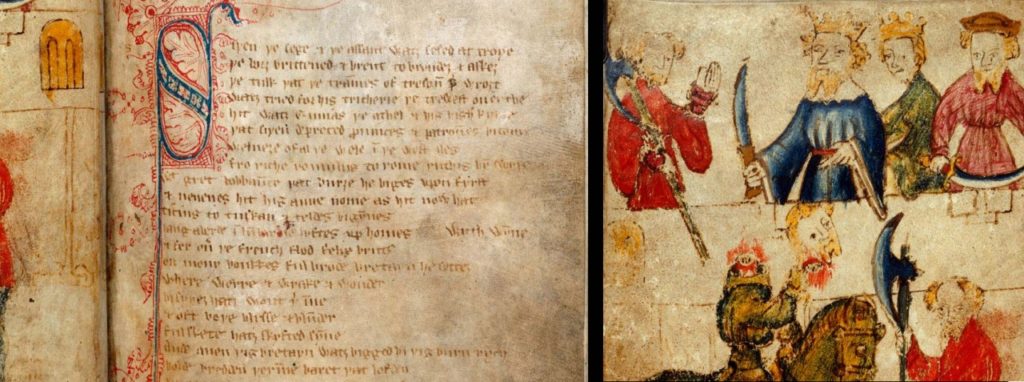This vocabulary tends to be everyday words (e.g. husband, skin, window; happy, ill, ugly; cast, die, scare), even personal pronouns (e.g. they), prepositions (e.g. until) and conjunctions (though). Many more terms are still used in the modern dialects of the areas where the Vikings originally settled (i.e. the so-called Danelaw; e.g. dale, fell, gowk; bain, gormless, mickle; attle, flit, laik). The Gersum Project has revolutionised the way in which we identify Norse loans in English by developing an innovative classification based on the reliability of the evidence for Norse derivation. A freely accessible online database classifying over 900 terms, a collection of essays and a series of journal articles will make our findings available to the academic community and other interested readers. We have also built a significant public engagement agenda, delivering 17 public talks, taking part in 4 radio interviews, etc. These activities have evidenced non-academic audiences’ interest in the effects that the country’s multicultural past has had on the English language, both at the local and national level.

With this follow-on project we aim to widen the public impact of our work by developing activities and resources that focus primarily on two sectors: education (primary and secondary school children and their teachers) and cultural heritage. We will:
1. Develop a series of online age-appropriate educational resources that will shape the way in which the lasting cultural impact of the Viking presence in England is taught in thousands of primary and secondary schools across the country. The resources will focus on present and past manifestations of Norse-derived words in English in general and the northern dialects in particular, with special emphasis on the North-West Midlands (the area where the texts included in the Gersum corpus originate). The resources will include written content, audio recordings by speakers from different dialectal areas, video recordings of lectures by the Gersum Team and other experts, interactive activities and downloadable resources that can be used in the classroom. Recent changes in the History A-level curriculum of the OCR examining board, where the prominence of this topic has significantly increased, underpin the timeliness of these resources.
2. Establish focus groups with teachers and examination board members, a teacher panel and training sessions in the use of the resources. Collaborating with the relevant stakeholders throughout the project and having the support of various educational organisations will enable us to create relevant and engaging resources that can be widely publicised and used.
3. Train York Archaeological Trust’s (YAT; our project partner) front-of-house staff (particularly those working at the JORVIK Viking Centre) in topics concerning the Vikings and their presence in England, with particular focus on their linguistic impact. Need for training has arisen as a result of JORVIK’s closure from 2015 to 2017 because of flood damage and subsequent staff changes. We will also provide YAT with a staff training manual for future use and linguistic information for their virtual learning environment.
4. Hold two family days at St Mary’s Creative Space (Chester), in conjunction with Cheshire Record Office, and YAT’s Barley Hall (York), respectively, as part of the nationwide Being Human festival, where visitors of all ages will be invited to explore the rich linguistic heritage of these dialectal areas through a series of activities aimed at different ages, including arts and crafts, storytelling and public lectures. The data and feedback that we gather during these days will further help the development of our educational resources.
Image Credits: Sir Gawain and the Green Knight, Cotton Nero MS A.X, art.3. British Library. Public Domain.
Website
Project Team
- Dr Richard Dance (Principal Investigator – University of Cambridge)
- Dr Sara Pons-Sanz (Co-Investigator – University of Cardiff)
- Dr Brittany Schorn (Research Associate – University of Cambridge)
- Jamie McLaughlin (Developer – The Digital Humanities Institute)
